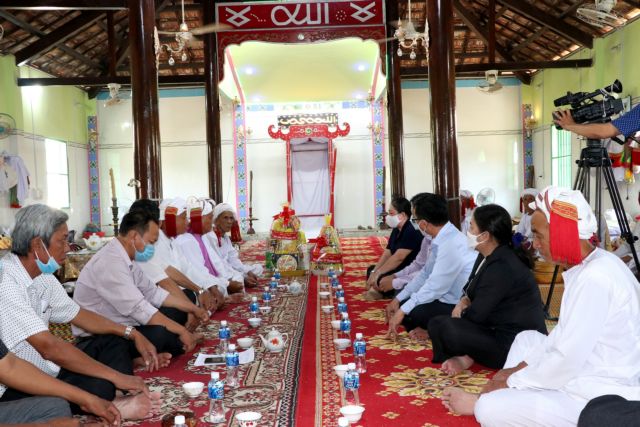 Society
Society

 |
| Local authorities visit Chăm ethnic people in Bình Thuận Province in April on the occasion of their traditional Ramuwan festival, which is the biggest festival for the Chăm community in Việt Nam. – VNA/VNS Photo Hồng Hiếu |
BÌNH THUẬN – The south-central province of Bình Thuận has invested in infrastructure projects and supported production in an effort to improve the lives of ethnic minorities.
The province has 34 ethnic groups with more than 100,000 people, accounting for 8 per cent of its population.
It has taken various measures to develop infrastructure facilities and agriculture and forestry production, and build up rural areas where ethnic minorities live.
One policy is that ethnic people are sold input materials for agriculture production on credit and pay back the loan only after harvesting and selling their crops.
The province People’s Committee assigned the province’s Mountainous Area Services Centre to implement the policy in 2004.
Since 2004, the centre has established many shops that sell input materials on credit to ethnic people and then buy their harvest later.
K’ Văn Vẳn in Hàm Thuận Bắc District’s Đông Giang Commune said under the policy he bought input materials from such shops and then sold his agricultural products to them.
“Life is better than before,” he said.
The centre has cooperated with seed companies to provide farming techniques such as growing rice or hybrid corns for ethnic farmers.
It has also cooperated with commune-level People’s Committees to find buyers for agricultural products.
Nguyễn Minh Chính, deputy director of the centre, said the centre had helped ethnic people get sufficient input materials for agricultural production, and reduced the likelihood of ethnic people borrowing from loan sharks and traders pushing down prices of agricultural products.
This had helped improve their lives, he said.
In 2016 - 2020, the province invested nearly VNĐ200 billion (US$8.6 million) to implement measures to support ethnic people to develop their production.
It built many infrastructure facilities such as roads, irrigation works and schools during the period.
All ethnic minority areas have concrete roads, facilitating travel and goods transportation.
Up to 98 per cent of ethnic households have access to national power grids.
The number of poor ethnic households has been reduced from 4,250 in 2016 to 1,700 in 2020.
To further improve the lives of ethnic people, the province People’s Committee has issued a plan for implementing the national target programme of socio-economic development in ethnic minority-inhabited and mountainous areas in 2021 – 2025.
Under the plan, the province will build more infrastructure facilities to serve socio-economic development in the areas.
The plan aims for all communes’ central areas to have roads for car travel which are paved with concrete or asphalt by 2025.
It also aims for all classrooms to be built with concrete and for 98 per cent of households to use hygienic water by 2025.
The province will spend VNĐ850 billion ($36.4 million) to implement the plan. – VNS




